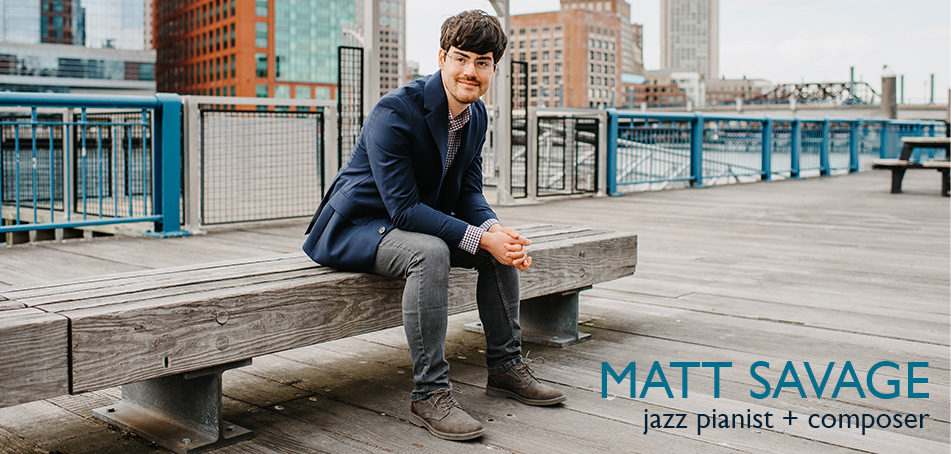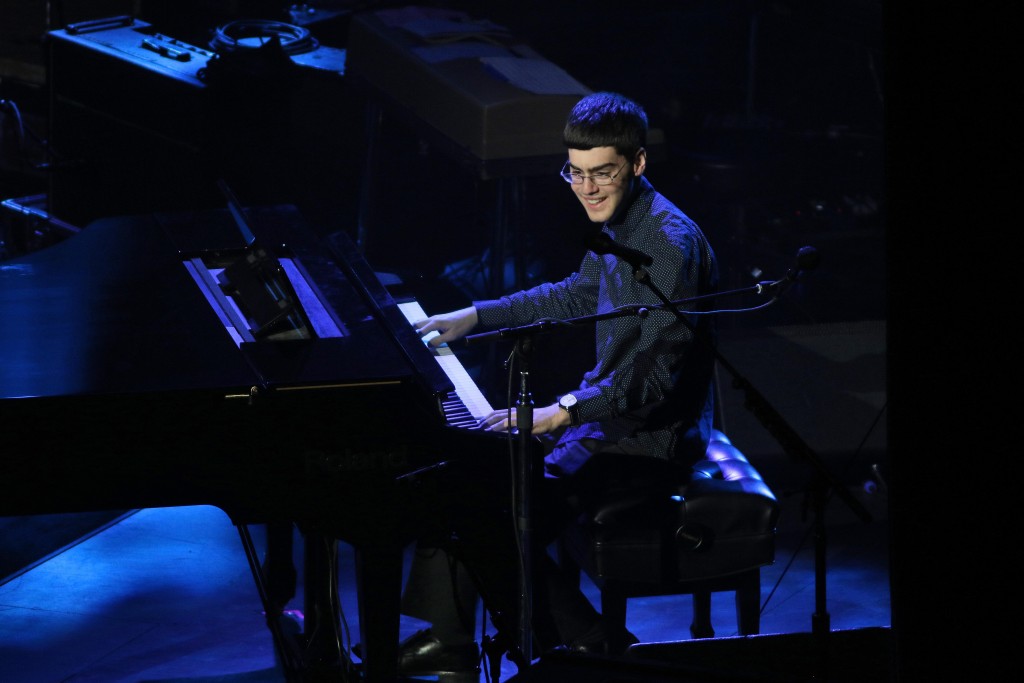From silence to sensation: Prodigy Matt Savage, born with autism, now a music veteran
Katherine Varga, Special to Rochester Democrat and Chronicle USA TODAY NETWORK
Published 6:30 a.m. ET June 17, 2018
In some ways, Matt Savage is a pretty standard 26-year-old. He lives in Boston, enjoys hiking, Star Wars and spicy food. He’s a fan of Harry Potter (and, as he points out, bears a certain resemblance to him).
He’s a pretty typical millennial, if you ignore the fact that he has performed with the likes of Chaka Khan, Wynton Marsalis and Jackson Browne and will be spending his summer touring India, Japan and China after performing two solo piano concerts at the Xerox Rochester International Jazz Festival on June 22.
Oh, and then there’s the detail that he’s a savant on the autism spectrum who started his career as a child prodigy.
Early days of quiet
Most music prodigies talk of childhood homes brimming with song. Matt doesn’t remember much about his early childhood, but he does know it didn’t contain much music. Because he was born on the autism spectrum, he had difficulty tolerating noise.
“Everything in the house had to be quiet all the time,” he says. “My mom would occasionally still play the piano for me but I would only want it at a very specific time.”
According to his mom, she would know to play if he led her to the piano and said “Peanuts” (to hear the Peanuts theme song) or “Fast!” (his name for the third movement of Beethoven’s “Moonlight” sonata). Any other time she played, he would try to knock her hands off the keyboard or, worse, scream.
His parents tried auditory integration therapy. The idea was to desensitize him to sound gradually, over the course of weeks, by introducing him to quiet beeps and building up to pop music.
For his parents, Diane and Larry Savage, helping their son cope with his autism went beyond therapy. It meant encouraging him to explore his interests.
When Matt showed an early aptitude and interest for math, his parents bought him math-related books and games. When he taught himself to read music at age 6, they signed him up for piano lessons a week later.
Learning a new instrument is always challenging, but Matt’s neurological tendencies added some difficulties. Kids with autism often want to stop and go back to the beginning every time they mess up. But with piano, students are often taught to keep playing to get to the end of a piece.
They’re also likely to want to use the right hand if something is happening on the right side of the body, and the left hand for the left side. But pianists sometimes need to cross hands when playing.
“That was very difficult for him,” Diane says, “but he wanted to play the piano so he forced himself to do it.”
Life in the spotlight
Matt Savage taught himself to read music as a child and never looked back.
Matt got good at solo piano. Really good. Savant good. But something was missing: He wanted to play in an ensemble.
“He instigated everything. We just followed his lead,” Diane says.
His parents started bringing him to a jam session where he could sign up to play with other musicians. Grownup musicians. This was where he first met bassist John Funkhouser, who currently teaches at the acclaimed Berklee College of Music.
Funkhouser wasn’t opposed to letting an 8-year-old play. “It’s a very non-judgmental kind of jam session, so I kept an open mind.”
As soon as he heard Matt play, he was amazed. It wasn’t just Matt’s technical ability; he also had a strong understanding of how to improvise over a form — something that most musicians take years of training to master.
“I thought, ‘Wow, how is that even possible?’ ” Funkhouser recalls.
Diane asked if Funkhouser would be willing to teach Matt to play in an ensemble, but he told her Matt already knew how to play with others. He just needed gigs.
But nobody Matt’s age could keep up with him. So Funkhouser happily joined the Matt Savage Trio. “He was the boss, and yet, we were his mentors in a way, the drummer and I.”
Around this time, the Boston Globe published an article about Matt and suddenly, gigs were not a problem.
“The media loves a child prodigy, and people love to read about them,” Funkhouser says. (Guilty as charged.) “In a way, certain things just fell in his lap.”
During the next several years, Matt appeared on The Today Show, 20/20, Late Night with Conan O’Brien, The Late Show with David Letterman, and NPR’s All Things Considered, to name a few. He performed across the country and around the world.
“He had complete control of where he played, when he played, what he played, if he played,” Diane says.
She reveals a telling anecdote: When Matt was around 9, NBC called him to be on a reality TV show where he would compete with other talented kids for a college scholarship. Matt said no. When his mom asked why he told her that music shouldn’t be a competition.
Wise beyond his years, Matt stunned audiences around the world with both his piano-playing and his original compositions. He also excelled in math and taught himself enough geography to win the New Hampshire Geography Bee. He was featured in documentaries and books about savants.
But then, Matt did what all children — even prodigies — do: He grew up.
Life as an adult prodigy
Savage also performs as a trio — and has been playing with other musicians since age 8.
Without the hook of being too short to reach the pedals, Matt faces the same business and marketing challenges that other very talented adult musicians do. What’s remarkable about Matt is that rather than outgrowing his talents, he has grown with them.
“He had this incredible thing handed to him and he ran with it as long as it went, and now he has to figure it out like everybody else,” says Funkhouser, who still plays with Matt a few times a year.
“Anyone who’s serious about the music, that’s what they do. They work hard, they continue to expand their horizons, expand their playing, expand their thinking. And I think he’s been doing all those things.”
This is evident from Matt’s most recent CD, Matt Savage: Piano Voyages, which is his first solo recording as an adult (he has released 12 CDs in total). He will be playing selections from that solo CD during his concert in Rochester.
For the record, during a more than 20-minute-long phone conversation, Matt said very little about his childhood fame, always finding ways to bring the conversation back to music.
When asked what it was like to perform for the president of Singapore as a 10-year-old (not a shabby gig at any age), he focused on the act of performing: “Certainly the event was fancier, but in many ways you’re still doing a concert just like usual.”
It wasn’t until I talked to the people who love him that some of the more impressive details popped up. Like how he graduated high school at 17 (he was home-schooled) and moved to Boston on his own to attend Berklee College of Music, before moving on to get his Master’s degree from the Manhattan School of Music.
Or how his mother trained him — at age 19 — to take over Savage Records so she could retire.
Taking over a music company as a teenager would be a remarkable achievement for anyone, and even more so when you take into account the social difficulties that arise from having high-functioning autism.
But Matt doesn’t dwell on his past accomplishments. He cares most about what’s happening now and what’s coming up. He mentions his excitement for the Matt Savage Groove Experiment, a quintet and vocalist that performs a musical fusion ranging from his original jazz compositions to pop covers.
As fitting for someone who, as a child, believed music shouldn’t be a competition, Matt enjoys encouraging other young artists. He cites jazz legends Charlie Banacos and Arturo O’Farrill as two of many teachers who have shaped and inspired him as an artist. Now Matt is giving back by through master classes and workshops (in both English and Spanish), private lessons and a faculty position at Bunker Hill Community College in Boston.
“In many ways, it’s a steadier career than performing, but the thing that’s most important is just the idea of training the next generation of jazz musicians,” he says. “It doesn’t just come out of the blue.”
Katherine Varga is a Rochester writer.
If You Go:
What: Matt Savage solo piano concert.
When: 5:45 and 7:45 Friday, June 22.
Where: Hatch Recital Hall (Eastman School of Music).
Tickets: $30 (cash only) at the door or Club Pass (available online at rochesterjazz.com).


